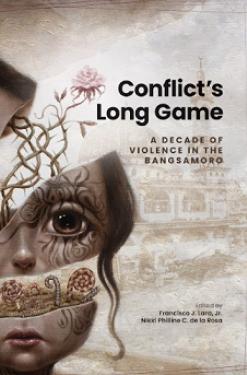
Conflict's long game in the Bangsamoro offers an incisive analysis of the peace and conflict terrain of the Bangsamoro region captured by a granular database of violent conflict incidents from 2010 to 2020. The reports in this anthology provide valuable insights into the intricate dynamics at play that policy makers, development workers, and peacebuilders can utilize when designing programs and initiatives that are both conflict sensitive and growth enhancing. Conflict Alert's panel data bares a tale of declining violence amidst newly emerging conflicts that national, regional, and local government units in Muslim Mindanao, including civil society, and businesses can only ignore at their own peril.
Edited by Francisco J. Lara, Jr. and Nikki Philline C. de la Rosa, leading scholars in Mindanao studies, this book exposes the high stakes involved—the ten chapters focus on the underlying conflict dynamics beneath political and governance-related violence, rebellion, violent extremism, identity based violence including gender, land and resource-related violence, and common crimes. These chapters uncover original insights on conflict strings, the morphing identities, and multicausal violence using statistical data woven in stories and narratives that speak of violence but also the triumph of peacebuilding efforts. The final chapter unveils the story behind Conflict Alert's development and implementation, sharing knowledge and insights that can help other regions and countries build a bespoke database that provide an objective and credible evidence base crucial for informing peacebuilding and development practice and policy. The book is particularly important in this critical time when communal and inter-state violence is on the rise.
"I cannot think of any other book that looks at the nature of post-Moro rebellion conflicts that is as analytically incisive and empirically rich as this anthology. The essays here cover Moro Lumad tensions as well as the role of gender in these conflicts. The fact also that several authors are women is an important corrective to a study of political violence in Moro Mindanao, a field dominated by male scholars and public intellectuals.” —Patricio N. Abinales, author of Making Mindanao: Cotabato and Davao in the Formation of the Philippine Nation-State.
Published in 2023.




